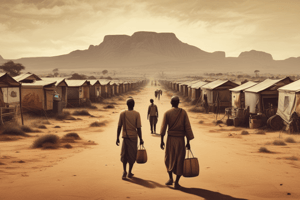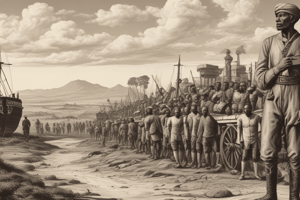Podcast
Questions and Answers
What was the primary reason behind Britain's annexation of Griqualand West in 1877?
What was the primary reason behind Britain's annexation of Griqualand West in 1877?
- To control the diamond trade
- To establish a new capital for the British Empire
- To prevent French control over the strategic Cape route (correct)
- To expand British colonies in Africa
What was the main consequence of the mining revolution on the Witwatersrand?
What was the main consequence of the mining revolution on the Witwatersrand?
- The transformation of South Africa into an industrialized capitalist state (correct)
- The discovery of new minerals
- The displacement of local African communities
- The establishment of apartheid policies
What was the impact of the introduction of large-scale mining on traditional lifestyles?
What was the impact of the introduction of large-scale mining on traditional lifestyles?
- It had no impact on traditional lifestyles
- It led to the establishment of new cities
- It resulted in significant socio-cultural changes (correct)
- It led to the preservation of traditional social structures
What was the main consequence of the policies imposed on local African communities?
What was the main consequence of the policies imposed on local African communities?
Who was a key figure in the consolidation of mining capital?
Who was a key figure in the consolidation of mining capital?
What was the main consequence of racial discrimination in the mines?
What was the main consequence of racial discrimination in the mines?
What was the result of the need for cheap labor in the mines?
What was the result of the need for cheap labor in the mines?
What was the significance of the discovery of diamonds in Kimberley in 1867?
What was the significance of the discovery of diamonds in Kimberley in 1867?
What social class emerged as a result of the mining boom in South Africa?
What social class emerged as a result of the mining boom in South Africa?
What was the main purpose of racial capitalism in South Africa?
What was the main purpose of racial capitalism in South Africa?
What led to the intensification of British efforts to consolidate control in South Africa?
What led to the intensification of British efforts to consolidate control in South Africa?
What was the outcome of British establishment of protectorates over African chiefdoms?
What was the outcome of British establishment of protectorates over African chiefdoms?
Who resisted British control in South Africa?
Who resisted British control in South Africa?
What was the result of the conflicts between the British and the Boer Republics?
What was the result of the conflicts between the British and the Boer Republics?
Which of the following was a significant consequence of the mining revolution on the Witwatersrand?
Which of the following was a significant consequence of the mining revolution on the Witwatersrand?
What was the primary motivation behind Britain's efforts to control resource-rich areas in South Africa?
What was the primary motivation behind Britain's efforts to control resource-rich areas in South Africa?
How did the policies imposed on local African communities affect their economic independence?
How did the policies imposed on local African communities affect their economic independence?
What was the outcome of the consolidation of mining capital in South Africa?
What was the outcome of the consolidation of mining capital in South Africa?
What was the impact of the introduction of racial discrimination in the mines?
What was the impact of the introduction of racial discrimination in the mines?
What was the primary function of the passes imposed on local African communities?
What was the primary function of the passes imposed on local African communities?
Which of the following was a consequence of the transformation of South Africa into an industrialized capitalist state?
Which of the following was a consequence of the transformation of South Africa into an industrialized capitalist state?
What was the primary outcome of the displacement of local African communities?
What was the primary outcome of the displacement of local African communities?
What was the effect of the mining boom on the social structure in South Africa?
What was the effect of the mining boom on the social structure in South Africa?
What was the purpose of the laws enacted during the mining boom?
What was the purpose of the laws enacted during the mining boom?
What was the result of the British establishment of protectorates over Basotho, Swazi, and Tswana lands?
What was the result of the British establishment of protectorates over Basotho, Swazi, and Tswana lands?
What was the response of the Boer Republics and African chiefdoms to British encroachments?
What was the response of the Boer Republics and African chiefdoms to British encroachments?
What was the main consequence of the discovery of gold on the Witwatersrand?
What was the main consequence of the discovery of gold on the Witwatersrand?
What was the nature of the labor force during the mining boom?
What was the nature of the labor force during the mining boom?
What was the primary consequence of the mining boom on the social structure in South Africa?
What was the primary consequence of the mining boom on the social structure in South Africa?
What was the primary purpose of the laws enacted during the mining boom?
What was the primary purpose of the laws enacted during the mining boom?
What was the outcome of the British establishment of protectorates over Basotho, Swazi, and Tswana lands?
What was the outcome of the British establishment of protectorates over Basotho, Swazi, and Tswana lands?
What was the response of the Boer Republics and African chiefdoms to British encroachments?
What was the response of the Boer Republics and African chiefdoms to British encroachments?
What was the primary consequence of racial capitalism in South Africa?
What was the primary consequence of racial capitalism in South Africa?
What was the outcome of the conflicts between the British and the Boer Republics?
What was the outcome of the conflicts between the British and the Boer Republics?
What was the primary driver of the transformation of South Africa from a primarily agrarian society to an industrialized capitalist state?
What was the primary driver of the transformation of South Africa from a primarily agrarian society to an industrialized capitalist state?
Which of the following was a result of the imposition of taxes and passes on local African communities?
Which of the following was a result of the imposition of taxes and passes on local African communities?
What was the outcome of the consolidation of mining capital in South Africa?
What was the outcome of the consolidation of mining capital in South Africa?
What was the primary consequence of the cultural disruption caused by the introduction of large-scale mining?
What was the primary consequence of the cultural disruption caused by the introduction of large-scale mining?
What was the primary motivation behind Britain's efforts to control resource-rich areas in South Africa?
What was the primary motivation behind Britain's efforts to control resource-rich areas in South Africa?
What was the outcome of the racial discrimination in the mining industry?
What was the outcome of the racial discrimination in the mining industry?
What was the primary consequence of the displacement of local African communities?
What was the primary consequence of the displacement of local African communities?
What was the primary outcome of the transformation of South Africa into an industrialized capitalist state?
What was the primary outcome of the transformation of South Africa into an industrialized capitalist state?
What was the primary consequence of the mining boom on the social structure in South Africa?
What was the primary consequence of the mining boom on the social structure in South Africa?
What was the main purpose of the laws enacted during the mining boom?
What was the main purpose of the laws enacted during the mining boom?
What was the outcome of the British establishment of protectorates over Basotho, Swazi, and Tswana lands?
What was the outcome of the British establishment of protectorates over Basotho, Swazi, and Tswana lands?
What was the response of the Boer Republics and African chiefdoms to British encroachments?
What was the response of the Boer Republics and African chiefdoms to British encroachments?
What was the primary driver of the transformation of South Africa from a primarily agrarian society to an industrialized capitalist state?
What was the primary driver of the transformation of South Africa from a primarily agrarian society to an industrialized capitalist state?




